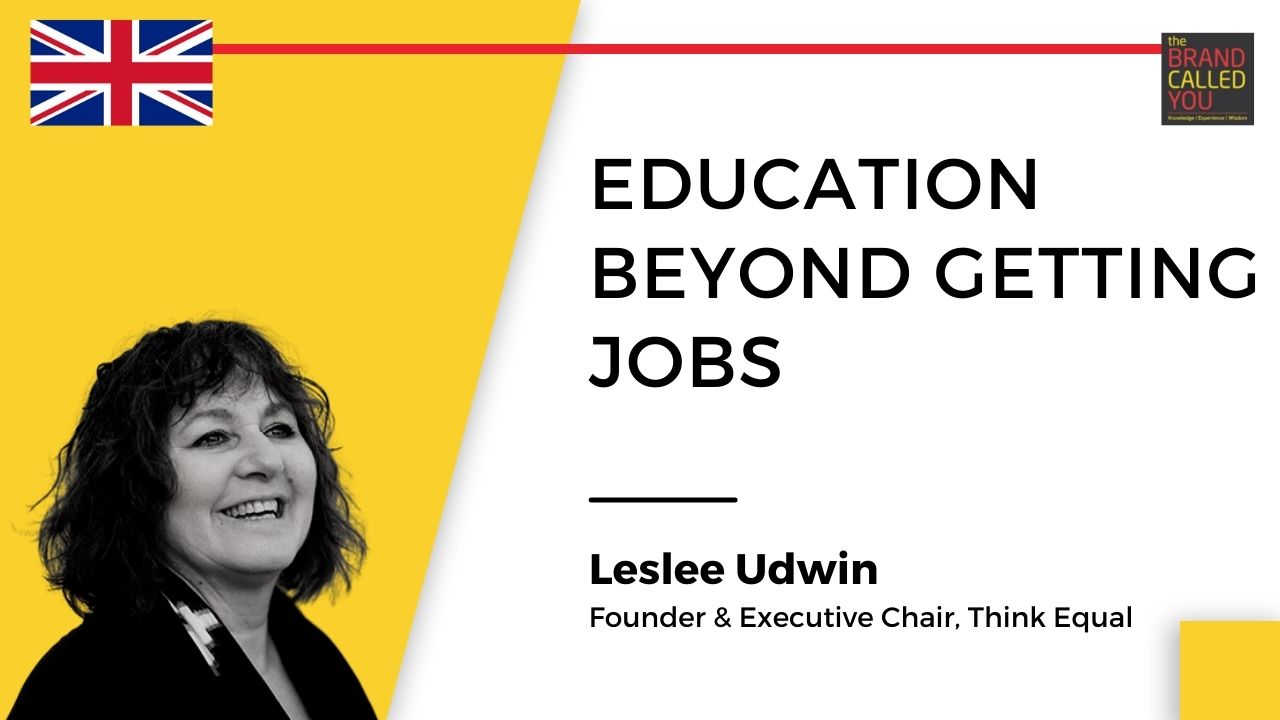Leslee Udwin, Founder & Executive Chair, Think Equal
Leslee Udwin is a human rights and education activist, who has been voted as the second most impactful woman in 2015 after Hillary Clinton. She is a former filmmaker and now a campaigner for systemic education.
Podcast
Overview
Education, we know, is ideally supposed to make us evolved human beings living in co-existence with each other professionally and socially. But recalling our school days, were we ever prepared for the real world? Were we taught how to handle the problems of life and the mental challenges that we will face as we grow up? Were we taught how to accept diverse cultures from around the world and live mutually with such diversity around? Well, we know what the case was.
With increasing crimes because of discrimination across ages based on gender, race, and nationality, there is a need to build a generation that grows up prepared to mingle with each other in this globalized world and respect every human being on the planet. Today, we have a celebrated filmmaker who has now turned her focus toward education and human rights.
About Leslee Udwin
Leslee Udwin is a human rights and education activist, who has been voted as the second most impactful woman in 2015 after Hillary Clinton. She is a former filmmaker and now a campaigner for systemic education. Today, she discusses her transformation from being a filmmaker to an activist, her role, and her vision.
DISCUSSION
Leslee talks about her journey from being an actor for around 15 years to being a filmmaker. She narrates a story of a criminal landlord who took over her house and she had to fight a long battle, winning it in the end. It was at the end of this battle, that she decided to switch to filmmaking. She says, “As an actor, I was the vehicle of others’ stories. As a producer, I could choose the subject matter and be a guardian of that vision and communicate things I think were important to humankind.”
She chose to become the director of a documentary based on the Nirbhaya case of India, “India’s Daughter” due to budgetary constraints.
Filmmaking Career
Leslee recalls the several instances she was threatened as she made films like “Who Bombed Birmingham” and “India’s Daughter”. For, “Who Bombed Birmingham”, she was threatened by British police and for “India’s Daughter”, she was faced with a threat to silence. Leslee calls it an “understandable reaction when confronted with your own shame.”
She recalls how the UK Prime Minister was angry in the parliament, who refused to have trials on television. Leslee, who is Jewish, exposes the discrimination amongst them as well. She says, “If we don’t criticize ourselves, there is no hope.”
She further elaborates on her experience of the ban in her film, “India’s Daughter”. Leslee narrates her motivation to go there in the first place, which was the anger and commitment of the protestors. However, she reveals that the call for a ban shockingly came from the Indian feminists and not the government.
Need for Change in Education
Leslee explains how our education model across the world is designed for just entering the job market. She asks, “Who is teaching our children to be moral and decent humans?”
She gives anecdotes from the rapists of Nirbhaya who didn’t feel they did anything wrong. She further elaborates on how their lawyers, despite being educated, were equally misogynistic. She says, “It was after that film was out, I shifted to tackle the roots of discriminatory mindset, which is the actual disease.”
She worked to get together experts in fields like psychology, neuroscience, education, and human rights. Further, they worked to incorporate some of their practical, tangible pragmatic tools. Leslee explains how they have prepared weekly lesson plans for teachers for the subject called, “Social-Emotional Learning for Social-Justice.”
They focus mainly on children in the age group of three to six, for making a strong foundation. She further says, “We create loving, collaborative 21st-century global citizens.”
The course, which is compulsory in schools of North Macedonia, is slowly gaining attention in other places as well. They are working with varied mother groups, Anganwadis, learning curves, etc.
Human Rights and Culture
Leslee calls culture the culprit of human rights discrimination. She explains how if she tries to make her subject matter culture adaptive, takes away the entire core of it.
She says, “Culture should rather refer to all the positive differences from one another that we can celebrate from diff countries in art and thought leadership.”
She again emphasizes the importance of mindset change for any positive change to happen, citing dowry as an example. We are all well aware that despite the ban, it is still largely practiced, especially in the South Asian region of the world.
Profile
Leslee was voted by the New York Times the No.2 Most Impactful Woman of 2015 award for Arts and Education. In 2019 Leslee was awarded the UN Women for Peace Activist Award at the United Nations, UN Association USA’s Global Citizen of 2019, and the Gandhi Foundation International Peace Award.
A former filmmaker and now campaigner for a system change in education, Leslee is no stranger to successful campaigns. Her film, ‘Who Bombed Birmingham?’, for HBO and Granada TV, directly led to the release of the ‘Birmingham Six’ after 17 years of wrongful imprisonment. Her feature film, ‘East is East, did much to promote tolerance and the celebration of diversity between the Asian and British communities and has become a classic film taught in schools across Europe.
Her documentary, ‘India’s Daughter’, has been critically acclaimed around the globe, won 32 awards, and is recognized as having sparked a global movement to end violence against women and girls.


